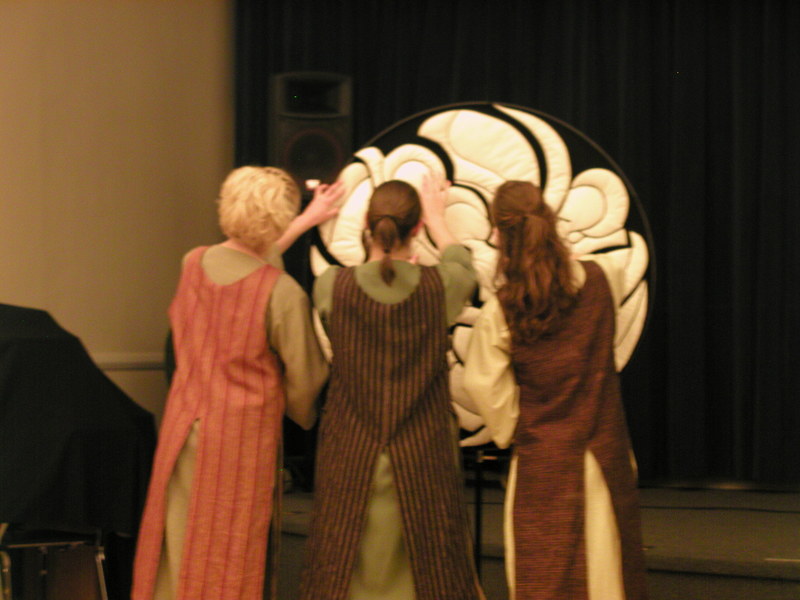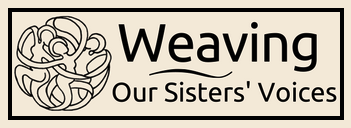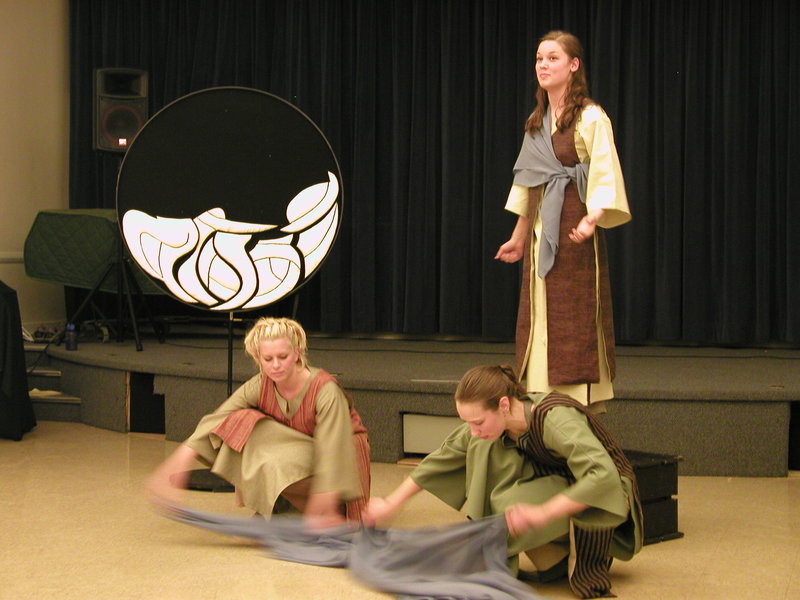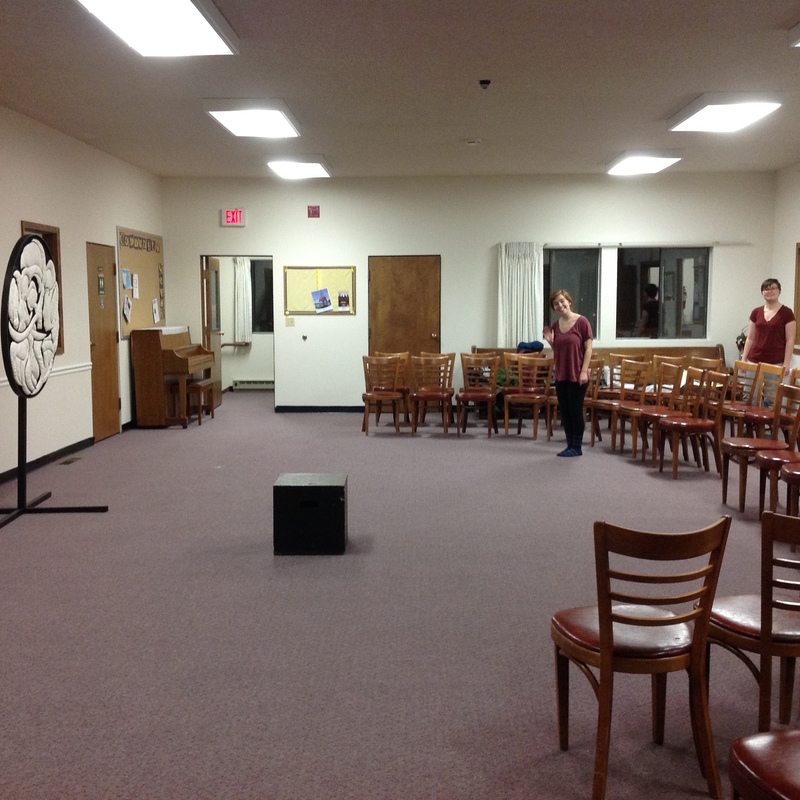On Tour
Just working with various community groups and booking the 2006 Tour was a learning experience. I would meet with people directly and explain this brand new project, but I knew it was a reach for them to try to imagine what the work would be like. The content was appealing, and the fact that the show was free was motivation enough for community groups to welcome us.
Weaving Our Sisters' Voices first official performance was on the Gonzaga Campus as part of the Campus Ministries Lecture Series on February 9, 2006. We were to perform in the Cataldo Building, in the Globe Room. This is mainly a conference room with a temporary stage at one end, but this show was to be performed intimately. The plan had always been to have the audience sit in a circle with the stage at one end. This way it was a community experience with the audience up close to the performance. We ended up having to set up two or three rows for the circle because there was such a surprising turn out. Though I love the intimacy of an audience of 20 or 30 in a single circle, our first large performance at the university was very gratifying. While not the intimate smaller show we had expected, the fact that so many came to support our work felt successful and gratifying.
The second show on February 24th, 2006 was very memorable. We performed at the Women’s Hearth for the 15th Anniversary Celebration for the umbrella-organization called Transitions. Women’s Hearth is in the heart of downtown Spokane and is a women’s drop-in center. I had actually learned about the organization in quite a roundabout way. All families have things they have to deal with, and mine was no different as I had an aunt who was a woman in crisis. She had struggled in her adult life with addiction and homelessness. She was a member of the population that I felt might really benefit from these ancient healing stories. I knew she had lived at the Miryam house (a residence for single, homeless women) which was quite serendipitous in that one of the stories from the production is that of Miriam. When I reached out to the organization, I learned they were part of this larger organization of Transitions. I met with the director of the organization in their Drop-in Center, and together we talked about how to best develop this partnership. She mentioned that that Spring they were planning the 15th anniversary celebration and this might be the perfect way to honor the work. Now, looking back, I realize what a risk these organizations were taking by booking this tour, and particularly this performance. She had not seen work I had directed, but she knew the subject matter was profound and agreed to let us perform in their meeting room. A partnership was born.
The night of the performance we entered the center uncertain as to what we might find, as with every performance, but leaving that night solidified the importance of the work we were doing. We arrived as they were wrapping up their activities for the day (art projects, poetry writing, and general connecting) and began setting out chairs for the performance. We learned that the Mayor of Spokane had been invited, as well as board members and all kinds of community members. We really didn’t know how many people to expect, but that didn’t matter. If there was only one person in the audience and they were impacted by these words, then it was worth it.

The 2006 cast placing the final pieces back on the medallion to represent healing. This message of the script resonated with the mission of Women's Hearth. Photo courtesy of Suzanne Ostersmith.
Once we joined the audience we were amazed to find it was a packed house. Every chair was taken and many were sitting on the floor and in the back. This was a large community outpouring in support of this great organization, and now they were waiting for the wonder of what this production might hold for them. In glancing around the room, it was quite evident this was a mixed audience of those that appreciated what Transitions had to offer because their lives desperately needed a safe place to be, but also community members who would not need the services of Transitions and believed in the power of what they had to offer. There were various other dignitaries, in addition to the Spokane mayor and his wife. And the show began…
Transitions’ goal is simply to end poverty for women and children in Spokane. Their four key elements match the goals within the writing of WSV:
- Respect for human dignity
- Community
- Support for growth and wholeness
- Support for the pursuit of justice
As the show began we had an engaged audience. Suddenly the poignancy of the lines were even clearer to those of us that had seen and performed it many times by now.
At one point in the performance one of the characters talks about an abusive relationship and she delivers the line ‘We didn’t have restraining orders in my day - I understand they don’t do much good even in yours!’ (Levite’s Concubine) and there was audible reaction from the audience confirming this reality. When the characters talked about their hopes, and fears, strength and despair, we felt it echoing among our sisters in the audience.
This kind of recognition by a live audience had a great impact on the performances that followed. Suddenly there was new meaning to the words because of this group of people that had been witness to this theatrical production, but also witness to challenges in their own lives. Somehow, when stories are shared it makes us feel less alone.
Even year’s later, this experience was impactful to those who were a part of it. In an email ten years later, an original cast member reflected with the following:
"The most memorable performance experience I had with Weaving was when we went to the women’s shelter. As we told the stories of the women from the bible and ancient times, I was aware of how many women seemed to feel that we were talking about then. I can’t know or fully imagine all the stories of trauma, loss, abuse, or even more horrific things these women likely experienced, but whatever those stories are, the ones we were telling were not so very ancient after all. It made me think that human suffering, women’s suffering, perhaps has not changed much in the years since those ancient women lived, and perhaps their stories of triumph and redemption can still be our stories of triumph and redemption. They fought then and we fight now, for fair treatment, equality, and sometimes just the basic acknowledgement of our simple humanity. While it could be depressing to think that we still fight the same fight, we honor each other in never giving up the fight. Perhaps as we put back together our fallen sisters, weaving those stories together, we reassembled at least a piece of the hurting souls watching us work."
- Sara Fleehart (Simmons), cast 2006
Suzanne Ostersmith


